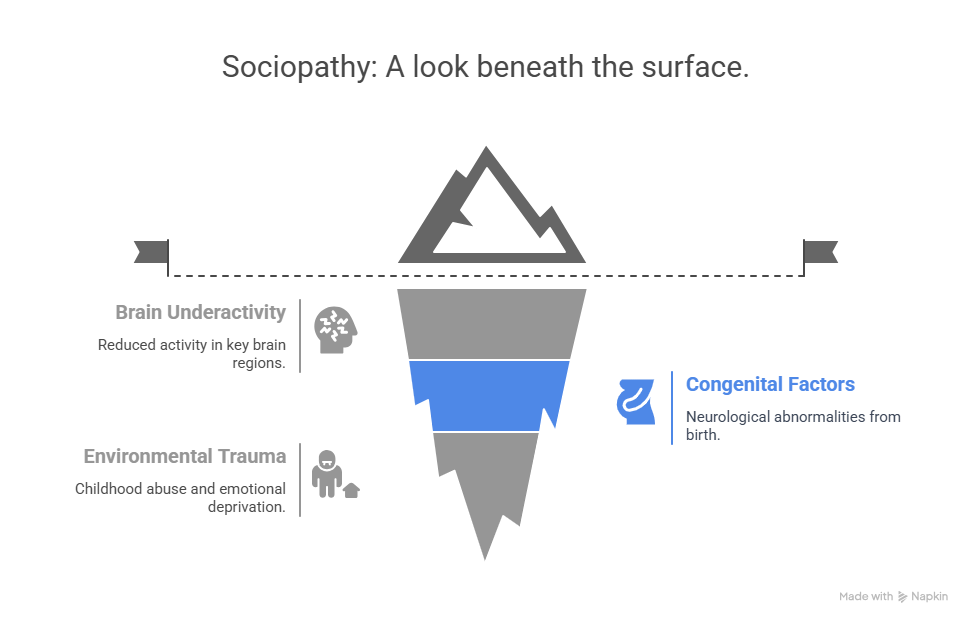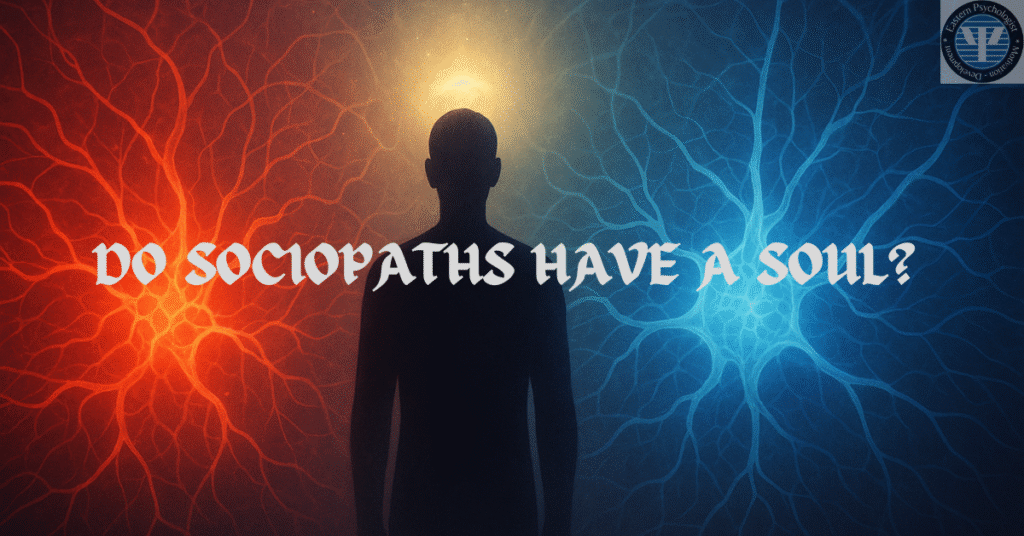Written By Rahhela Shahid & Taaha Ahmad
Table of Contents
“She never cried at funerals.” Not as a child. Not even when her grandfather died, as she recounts in her memoir, did she’d always know something was different about her this taught her to smile when other folk smiled, to close her eyes and look down, when injured, but all this by imitating. In herself she could feel nothing, there was a vacuum where feeling ought to have dwelt. Is she a Sociopaths?
This isn’t fiction. This is a real-life account of a woman who discovered she was a sociopath. She described herself as “emotionally hollow”, unable to feel guilt or empathy. But what startled readers most was not her apathy; it was her awareness. She knew she should feel things. She just… didn’t. And she wasn’t unaware of the moral implications of this absence. That knowledge haunted her, even if the feelings themselves never arrived.
This unsettling story forces us to ask: What happens when someone feels no remorse, no shame, no love? Do they still have a soul?
In this piece, we’ll explore the crossroads of neuroscience, Islamic ethics, and psychological development to address a haunting question: Do sociopaths not have a heart? We’ll begin with the biology of sociopathy, journey through Islamic reflections on the soul and conscience, then bridge the gap between science and spirituality to uncover a deeper truth that challenges how we view the human spirit.
The Broken Compass: What Neuroscience Reveals
Contemporary neuroscience provides haunting information on how the sociopathic mind works. According to functional MRI research, patients with antisocial personality disorder (ASPD) are characterised by understimulation of regions involved in emotion management and moral decision-making, which includes the amygdala, ventromedial orbitofrontal cortex, and insula.
These are the areas that are responsible for fear, empathy and decision making. In case they are impaired, an individual is unable to fear or be compassionate. They lack or have a disrupted emotional guide that they cannot orient themselves in the social world like other human beings are capable of doing.
One large review noted that sociopaths often lack “moral emotions, empathy, conscience, or remorse.” Their minds just do not react as ours do to suffering or a wrong act.
Other scholars state that the neurological deviation is inborn, that a person was born with a different way of wiring their brain. Others posit that in many cases sociopathy will emerge because of certain trauma that occurs within the environment like abuse, neglect or emotional deprivation as a child. The result of these disruptions on brain growth at such early stages can also stunt or change some sections associated with emotional processing.
“Psychopaths are born, sociopaths are made,” as the saying goes. But the result is disturbingly similar: a human being without emotional brakes, whose internal warning system fails to engage.

When the Conscience Is Silent
Well, what is its significance? Just imagine a child who does not flinch when other people cry. And now imagine the same child becoming an adult, and learning to pretend to have empathy, but not because he/she does, but because she/he realises it will make people accept her/him as one of them and not notice the trembling hands under the table.
This isn’t just theoretical. In her memoir, the sociopathic author writes, “I learned to mimic emotions before I understood them.” She recalls watching classmates at school, studying their faces, and copying their reactions. Over time, it became automatic, a skill she mastered like a foreign language.
She admitted, “I knew the difference between right and wrong. I just didn’t care.” The fearful dissonance of the sociopathy is attracted by that mean sentence: knowledge of moral is not a knowledge of moral feeling.
Psychologists often describe sociopathy as the absence of a conscience. But even that may oversimplify the truth. Some sociopaths report a kind of inner struggle, a pressure, a void, even a dull pain, when they realize they feel nothing in moments that demand deep emotion. It’s not total oblivion, it’s a chilling kind of self-awareness.
One described it as being a geyser in her that needed to explode. Such a spine-chilling expression implies that although the conscience may be shattered, the consciousness of its failure does exist. They are educated on what they are missing, and sometimes this knowledge hurts.
Not All Is Lost: Can Sociopaths Change?
This brings us to an important question: Can sociopaths learn empathy?
Certain scientists think that it is so. The diagnosis of sociopathy has been described as an emotional learning disability by one practitioner. In other words, as sociopaths are not born that way, they can always be taught the behaviour behind empathy, as the deaf person with dyslexia can be taught to read with assistance.
There is increasingly positive data that, with the help of therapy, early intervention and planned training in working with emotions, individuals with antisocial characteristics are more likely to be sensitive to signs of communication, control their adverse attitudes and even acquire a primitive understanding of the world of human emotions.
There is hope in the power of the brain to remake itself (neuroplasticity). That does not necessarily imply that a person never develops a conscience just because he or she did not develop one in a normal way. Change is possible, with effort, with structure, and with support, and it may be by increments only.
But it is not only science which gives it all. To that we must resort to the ethics of Islam whose vocabulary of the soul, intention and mercy provide such penetrating views which science cannot even get at.

The Islamic View: Soul, Self, and Responsibility
To Islam, all humans are born in their natural state called the fitrah. This consists of fundamental adherence to a complex and truth, goodness and consciousness of God. Although one can be influenced by his or her environment to act, the individual has a soul which has the capacity to know when it is wrong or right.
There are three nafs (self/soul) according to the description provided by the Quran:
- The commanding soul (nafs al-ammarah) – driven by base desires.
- The self-reproaching soul (nafs al-lawwamah) – aware of guilt and error.
- The peaceful soul (nafs al-mutma’innah) – in harmony with God.
God says:
“And I do call to witness the self-reproaching soul.” (Qur’an 75:2)
This verse acknowledges that guilt is part of the human design; we are meant to correct ourselves. Even if someone is born into hardship, the capacity for moral growth is always present.
There is also the emphasis on centrality of the heart in the behavior of human being by the Prophet Muhammad (S.A.W):
“Beware! In the body there is a block of flesh, that, when it is good (reformed), the whole body be good, and when that block of the flesh is corrupt, the whole body be corrupt also, and that is the heart.”
This hadith is a call back to what really history preaches: inner moral reform. A hard heart can be broken, even a heart hardened by sorrow, or pain, or apathy, is softened and healed with labor, and the assistance of God. 1
Mercy: The Door That Never Closes
One of the most beautiful teachings in Islam is the boundlessness of divine mercy.
The Prophet ﷺ said:
“By Him in Whose Hand is my soul, if you did not sin, Allah would replace you with a people who would sin and then seek His forgiveness, so He could forgive them.”
This isn’t permission to sin, it’s a testament to hope. No matter how lost a person may be, the door to repentance remains open.
In another narration, he said:
“Allah is happier over the repentance of His servant than is one of you when you would lose something in the desert and subsequently you would find your camel.”
This hadith is a vivid image: it seems that a person, when looking inside, is dead, but the mercy of God may touch his/her soul. Their soul can be accessed, even in the case of failure to feel a guilty brain.
According to the Muslim point of view, there is no human being who is not worth redemption even the one who does not feel anything. Soul is not killed by a brain damage or coldness.

Science and Faith: Two World Views of the Same World
So, what’s the answer? Do sociopaths have a soul?
Science might say, “We don’t know; they have damaged emotional circuits.”
Faith replies, “Yes, and their soul still matters.”
Where neuroscience highlights dysfunction, Islam reminds us of dignity. Where psychology sees patterns, revelation sees potential.
Importantly, this isn’t a debate of one vs. the other. Science and faith aren’t enemies. They’re allies. Both help us understand the full human condition, the seen and the unseen, the biological and the spiritual.
CBT and trauma therapy may allow one to reconnect with emotions with the assistance of a therapist. They may get a spiritual leader who can make them understand their actions in a moral way and who can provide hope and guidance.
In both cases, the message is the same: You are not stuck. You are not soulless. You are not beyond help.
Conclusion
Sociopathy makes human beings question what it is like to be human. However, when science and Islam are put together into dialogue, the deepest element comes out:
- Even if the brain struggles to feel, the soul still knows.
- Even if empathy is missing, accountability remains.
- Even if remorse is absent, redemption is possible.
The Prophet ﷺ was not sent to diagnose people, he was sent to “perfect good character.” His message wasn’t just for saints. It was for sinners, strugglers, the broken, the numb, the cold-hearted. People like us. People like them.
When you or a relative feels estranged to empathy, there is still an answer, moving towards therapy, praying, working and mercifulness of god. 2
We are not just neurons. We are not just souls.
We are both. And in both lies hope.
CTA:
Once you start thinking, or reflecting on this article, share it with someone to whom they need to listen. Respond in this box, or receive even more of this type of thing in your mailbox simply by clicking the subscribe button here.


Pingback: 7. The Narcissist’s Masquerade: A Hidden Mind Empty Of Remorse - Eastern Psychologist